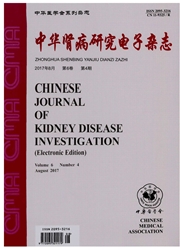

 中文摘要:
中文摘要:
急性肾损伤是临床常见病,其发病率有逐年升高趋势。伴有急性肾损伤的危重症患者往往具有高死亡率的特点。近年来,开展了众多不同于传统疗法的治疗研究,以期改变急性肾损伤患者预后不佳的现状。其中,细胞疗法逐渐发展为一种用于治疗大量临床疾病的新方法。出于安全考虑,体外细胞疗法可能会是一种更好的选择,因为其不仅替代了受损细胞的功能或调整了病理生理过程,而且提供了免疫绝缘屏障。本文就肾小管上皮细胞、粒细胞及血管内皮细胞的不同体外细胞疗法做出阐述。相比于传统的连续性肾脏替代治疗,肾小管上皮细胞、粒细胞的体外细胞疗法对于急性肾损伤患者的存活有着重大且积极的影响。上海交通大学医学院附属第九人民医院肾脏科构建了一种血管内皮体外细胞治疗系统,可明显改善脓毒症动物的血流动力学稳定性及多种脏器功能,并提高存活率。这些研究对于改善急性肾损伤患者的预后具有积极意义。
 英文摘要:
英文摘要:
Acute kidney injury( AKI) is a common disease,with an increasing incidence,and critically ill patients with AKI are usually associated with a high mortality. Recently,novel therapeutic approaches have been developed to change this dismal prognosis in patients with AKI,among which cell therapy has developed into a new method to treat a vast array of clinical disorders. For safety reasons,extracorporeal cell therapy may be a better choice,which not only replaces the function of injured cells or modulates the pathophysiological processes,but also provides an immunoprotective barrier. This review focused on different extracorporeal cell therapies with renal epithelial cells,granulocytes,and vascular endothelial cells. Extracorporeal cell therapy with renal epithelial cells or granulocytes has a significant positive effect on the survival of patients with AKI,compared with the conventional continuous renal replacement treatment. The authors had developed an endothelial cell therapy system, which could significantly improve the cardiovascular performance,organ function,and survival in animals with sepsis.These advances will result in an improvement of the current dismal prognosis of patients suffering from AKI.
 同期刊论文项目
同期刊论文项目
 同项目期刊论文
同项目期刊论文
 Is the Serum Vitamin D Level at the Time of Hospital-Acquired Acute Kidney Injury Diagnosis Associat
Is the Serum Vitamin D Level at the Time of Hospital-Acquired Acute Kidney Injury Diagnosis Associat 期刊信息
期刊信息
